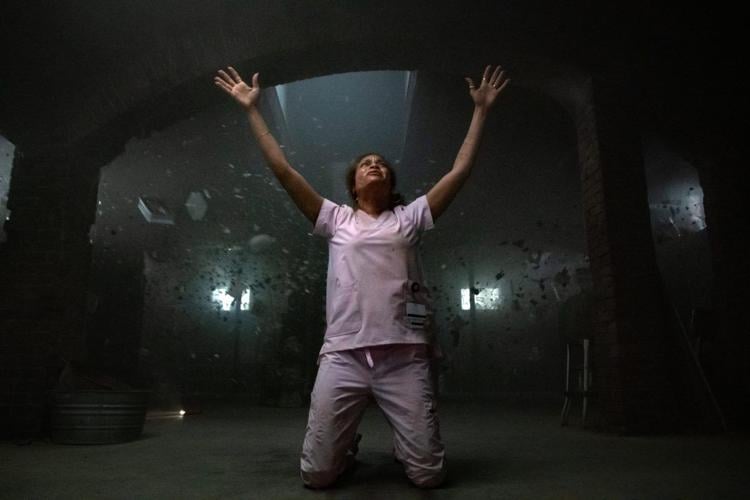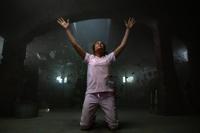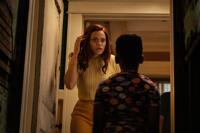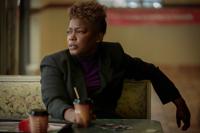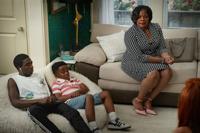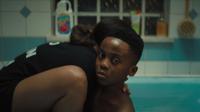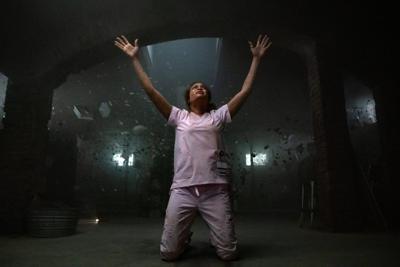If you've seen The Exorcist (1973), The Amityville Horror (1979), Poltergeist (1982) or even the more recent The Conjuring (2013), there is nothing here that will surprise you. This film, directed by Lee Daniels (Precious), and co-written by David Coggeshall (Orphan: First Kill) and Elijah Bynum (Magazine Dreams), is borrowing from all of those classic or more successful, horror flicks. Aside from centering on an African American or mixed-race family, what stands this film apart from those aforementioned titles is that this film is extremely more evangelical. Yes, The Exorcist had a Catholic priest as the hero, but it didn't feel as evangelical as this film does. Evangelism is about converting people who aren't of faith or who aren't Christian into full-blown Jesus worshipers.
Even if the priest or the religious figure in The Exorcist or The Conjuring had been evangelical in any of their scenes, the plot didn't involve a narrative that results in a Christian conversion or it perhaps isn't as heavy-handed as it is here. Daniels' film is very much proselytizing, not only in a thematic way but in a narrative way. The protagonist here very much goes through a Christian conversion in a literal fashion. Plenty of horror films have faith or have characters of faith, but this one is more bluntly faith-based as to put it more in the camp of titles under Affirm Films or the Great American Pure Flix.

Andra Day (The United States vs. Billie Holiday) stars as Ebony Jackson, an alcoholic who is the mother to three children. She's a single mom who has custody of her kids, but the only reason she does is because the father of her children is in the military and is deployed to Iraq. It's 2011, so soldiers are still being deployed to Iraq. Because of her alcoholism though, Ebony has to be supervised by the government. She works as a hairdresser in a salon or beauty shop, which affords her the ability to buy a house or possibly rent one, but she's currently struggling to pay the bills.
She would probably be in a better financial place, but she has her mother move in with her. Ebony needs her mother's help with raising her children. However, her mother ends up adding an extra financial burden. Those financial burdens aren't shared with the children and it causes unnecessary friction. Those financial burdens aren't shared with Ebony's mother either, which also causes unnecessary friction with Ebony and her mother.

Glenn Close (Hillbilly Elegy and Fatal Attraction) co-stars as Alberta Jackson, the mother to Ebony. She's a white woman who clearly has lived in a predominantly Black community for a long time, if not all her life. It means that Ebony is biracial with her father being a Black man. We never learn anything about her father, but it also means that Alberta's grandchildren are mixed race. The casting of those grandchildren doesn't reflect their mixed-race background. Ebony's children are all darker skin than her, but they must take after their father whom we never see.
Yet, Alberta being a white woman in a Black community is an aspect that isn't really explored. It's a contentious point in a couple lines of dialogue, but it's not explored in a substantial way. Except, Alberta has a sassy nature and speaks in what could be called "Ebonics." Alberta's trans-racial identity doesn't need to be explored because this film isn't really about race, despite the topic being raised tangentially. The main issue regarding Alberta is the fact that she is a cancer patient. We don't learn what kind of cancer, but she's getting treatment, such as chemotherapy. It's not clear, but it's likely her cancer triggered her religious conversion and her being a Bible thumper to some degree.

Aunjanue Ellis-Taylor (Origin and King Richard) plays Bernice James, a woman who is basically stalking Ebony and her family. At first, Ebony thinks Bernice works for the government and is trying to take custody of her children. Bernice is rather a mysterious figure for the first, two acts of the film. She really doesn't enter as a character till the third act. She's comparable though to the priests in The Exorcist, even though she herself isn't a priest.
Mo'Nique (Bessie and Precious) also co-stars as Cynthia Henry, a woman who actually does work for the government. She is trying to take custody of Ebony's children. She's very antagonistic toward Ebony and Alberta, mainly because she believes that the children are being abused. From her vantage point, there is evidence that some abuse is happening. Daniels' directs some scenes where that ambiguity is there, but that ambiguity is short-lived. Cynthia exists more so as the voice of skepticism, but that voice is rather shouted down.

Not having that ambiguity is a bit of a detriment, but all those classic horror films, from The Exorcist to The Conjuring, don't have that ambiguity either. There is an acceptance of the supernatural, but it's how that supernatural element is utilized. A lot of that supernatural stuff isn't utilized all that well here. A lot of it is taken from those aforementioned horror flicks. There's nothing new or innovative. The filmmaking here isn't all that compelling either in that it's not scary at all.
Anthony B. Jenkins (Roswell, New Mexico and Chicago Med) plays Andre Jackson, the youngest son of Ebony. If this were The Exorcist, Andre would be the Regan, as played by Linda Blair. He's set up as the possessed child under demonic control. There's potential scary things to be had with Andre, but the film is more focused on the melodrama between Ebony and Alberta. There are some chilling moments that Jenkins gets to play in a very creepy way, but it feels derivative of The Exorcist. There are plenty of haunted house or possession films that can come up with new and scary things. The Conjuring had the clapping game, which felt innovative. Hereditary (2018) does horrifying things with a nut allergy and a sketchbook that felt innovative.

Caleb McLaughlin (Concrete Cowboy and Stranger Things) plays Nate Jackson, the older brother to Andre and eldest child to Ebony. He's the one who stands out the most, other than Andre, in terms of which child character gets more to do. Demi Singleton (Godfather of Harlem and King Richard) rounds out the cast as Shante Jackson, the middle child and only daughter of Ebony. Her character gets the shortest of short shrift and has the least to do here.
Rated R for violent content, language and some sexual references.
Running Time: 1 hr. and 52 mins.
Available on Netflix.

